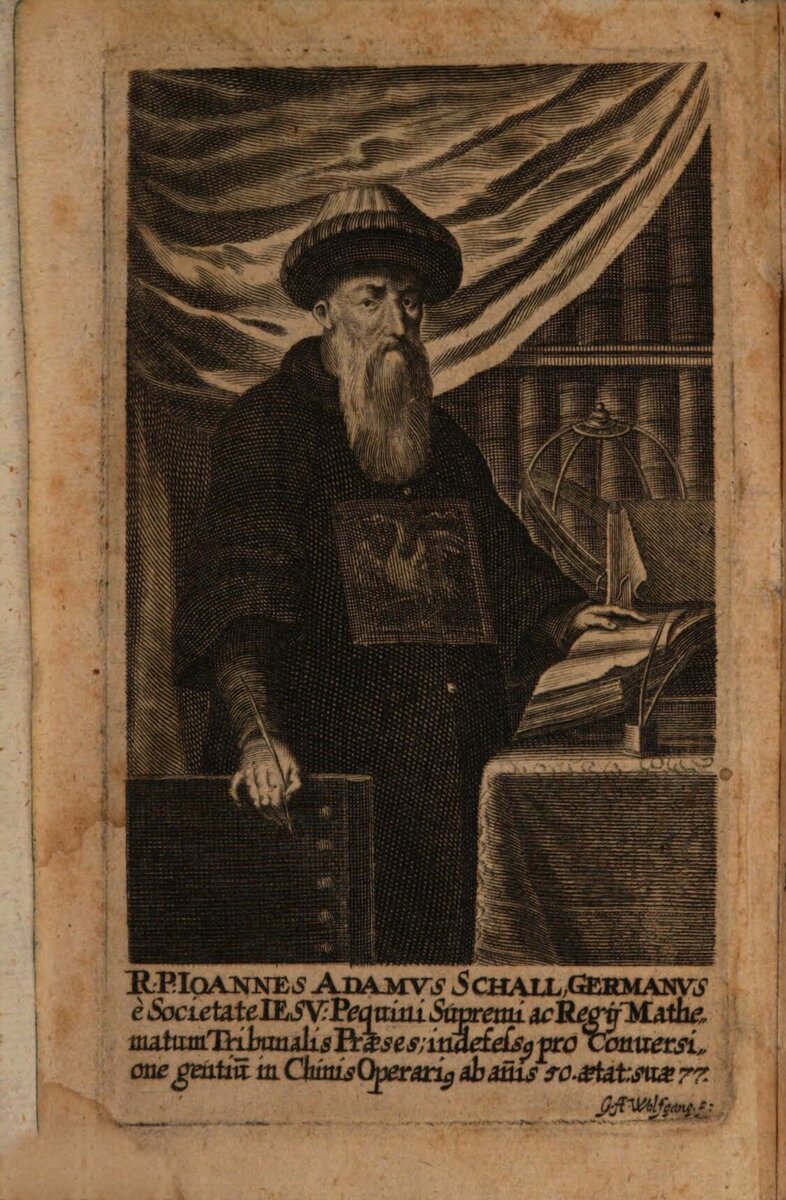Overcoming German “Otherness” Abroad: Johann Adam Schall von Bell (1672)
Abstract
The German Jesuit Johann Adam Schall von Bell (1592–1666) went to China as a missionary and learned the Chinese language. Like other European missionaries there, he faced significant hurdles on account of being a foreigner. To compensate for his “otherness,” he capitalized on his “European” astronomical and mathematical knowhow. At the Imperial Court in Beijing, Schall was put in charge of reforming the old Chinese calendar; he was also responsible for the mathematical education of future civil servants. This work helped Schall gain a foothold in Chinese court society, and he used these connections to spread the Catholic faith.
The portrait below shows Schall in his role as Imperial court astronomer. Dressed as a Mandarin, he is shown with astronomical instruments and attributes of scientific knowledge. Although Schall seems to have identified primarily as a “European,” the image caption identifies him as “Germanus.” The portrait served as the frontispiece to Johannes Foresius, Historica Relatio De Ortu Et Progressu Fidei Orthodoxae In Regno Chinensi Per Missionarios Societatis Jesu […] (1672).
Foresius’ account also provides (p. 10) a brief description of Schall’s presentation at the Imperial court, where he was again introduced as “Germanus” or “a German.” Centuries later, this portion of Foresius’ text was translated from the original Latin into German and published in Vienna in 1834. This description has been translated into English (from the German) for this project and follows here: “[ . . . ] This Doctor Paulus seized the occasion to put the mission of the Jesuits on a solid footing. When he heard that the mathematicians were to be punished for the error that had occurred, he cleverly placed even the blame for this error more on the faulty nature of the Chinese calculation method than on the Chinese astronomers and asserted that a more correct calculation method could be shown only by the Europeans, who were likewise versed in divine law; they would gladly share this method with the Emperor. To make his speech more credible, he presented the authorities with a treatise on the solar and lunar eclipses, written on the finest Chinese paper, which Father Adam Schall had composed in two parts. Father Schall was a German from whose letters this story is taken and who as a youth had resided years ago in the royal city to teach himself about Chinese literature. [ . . . ]
Source of excerpt: Geschichte der chinesischen Mission unter der Leitung des Pater Johann Adam Schall, Priesters aus der Gesellschaft Jesu. Translated from Latin and accompanied with notes by Ig[naz] Sch[umann] von Mannsegg. Vienna: Mechitariste-Congregations-Buchhandlung, 1834, pp. 45–46. Available online at: https://mdz-nbn-resolving.de/details:bsb10569878
Source

Source: Johannes Foresius, Historica Relatio De Ortu Et Progressu Fidei Orthodoxae In Regno Chinensi Per Missionarios Societatis Jesu Ab Anno 1581. usque ad Annum 1669. Ab Anno 1581. usque ad Annum 1669. Ratisbonae, Ratisbonae: Emmrich, Hanckwitz, 1672, frontispiece. Available online at: https://mdz-nbn-resolving.de/details:bsb10569652
Bayerische Staatsbibliothek (BSB)
Further Reading
Florence C. Hsia, Sojourners in a Strange Land: Jesuits and their Scientific Missions in Late Imperial China. Chicago: University of Chicago Press, 2009.